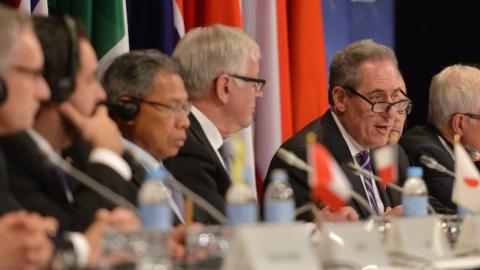Donald Trump, Ted Cruz, Bernie Sanders, and Hillary Clinton have all come to the same conclusion: no more nice guy when it comes to trade. Voters are convinced free trade is inimical to their interests, and even if it were a good thing our trading partners don't play fair. They have a point. China continues to keep its markets closed to many U.S. products, and as its economy shifts from low-tech manufacturing to one based on the consumer sector, the list of goods that can be imported shrinks. In Europe, regulators are raising the costs faced by American multinationals doing business in the EU, allegedly to prevent competition-law violations and tax evasion, while the European Central Bank and the Bank of Japan move to negative interest rates in (not always successful) efforts to drive down their currencies and drive up the dollar, hoping to encourage EU exports while making life more difficult for US exporters, slowing our growth rate.
All presidential candidates oppose President Obama's Trans-Pacific Partnership (TPP) that would cut tens of thousands of barriers to trade between the twelve signatory countries. Bernie Sanders boasts that he has opposed all such deals; Hillary Clinton, was for TPP until she turned against it, either out of conviction or to appease the trade unions and her Left; Donald Trump doesn't much like any of our trading agreements and would re-negotiate the lot; Ted Cruz seems to have supported TPP at one time but now claims he always opposed it. That leaves the President and a few pro-business Republicans supporting TPP, not enough political muscle to make it happen.
We have always had our protectionists, mostly Democrats allied with trade unions, but nevertheless officially favored free trade. Two things changed the balance of forces on this issue. First, even those who believe that freer trade stimulates economic growth have had to concede that the balance of winners and losers is not quite as they expected. Free trade advocates always knew that these pacts were good for big business, opening markets for their products. And they knew that consumers would benefit from the availability of lower-priced consumer goods – drop in at any Walmart for proof. What they didn't count on was the impact on blue collar workers, many no longer young, who find it difficult to shift from the industries hard hit by foreign competition to the new, high-tech industries or to those benefiting from increased export opportunities. It is not a mere matter of going to where the new jobs are, although the high incidence of home ownership in the US makes pulling up stakes difficult, especially during the recent slump in the housing market. Nor is retraining always a possibility: it is a long way, and not only in miles, from the coal mines of West Virginia to a cubicle in Silicon Valley. Most often, it is a matter of finding work that pays wages of the sort that financed the emergence of the great American middle class. MIT economist David Autor and colleagues at the Universities of Zurich and California find that after a "China trade shock", wages and labor force participation rates in affected communities remain low, and unemployment high "for at least a decade…".
Anecdote often has a greater impact than such academic studies. Bloomberg Businessweek reports that when A.O. Smith moved its electric motor factory from Kentucky to Mexico, its 1,100 workers, many earning $16.10 an hour, were replaced just across the Rio Grande by counterparts paid $1.75 an hour. Displaced workers who could find work – no easy thing when a town of 4,000 souls loses 1,100 jobs -- earn far less than half of what they once made, and are natural supporters of Donald Trump's plan to "Make America Great Again" by slapping a 35% duty on Mexican goods.
Don't tell them that they are better off because they can buy cheap imported trainers and tee-shirts. Or that Messrs. Autor and colleagues in the end support TPP because the hit to American manufacturing is irreversible, and the new trade deal contains benefits for U.S. owners of intellectual property and others. Or appeal to their better angels by pointing out that free trade has raised living standards in Mexico and China, which many tenure-protected academics like to do.
Unfortunately, supporters of free trade in the business community are not particularly effective defenders of its advantages. When Ford announced plans for a new small-car assembly plant in Mexico, where wages are one-fifth those paid union workers in the US, CEO Mark Fields defended the move by saying, "We will do what's best for the business." Little wonder that some two-thirds of Americans want more restrictions on imported goods, and are being promised by all candidates that they will get what they want in the coming year. Which might mean that they actually will.
When calm returns to the American political scene after the votes are tallied in November and the new president takes the oath of office in January, it might be possible to begin shaping a sensible trade policy. But the odds are against it. The argument that freer trade increases aggregate economic growth is neither widely believed or, if it is, not considered by most voters to be as important as the fact that individual winners seem to gain very little while easily identifiable losers lose a great deal when imports increase. The benefits of cheaper goods are spread across millions of consumers, often only vaguely aware that trade is the source of their bargains; the cost of replacing made-in-America stuff with imports is concentrated on hundreds of thousands of unemployed or lower-paid workers who know the cause of their problem, and are making themselves heard by voting for Donald Trump and his proposed 35 percent tariff on Mexican imports.
Nor are promises of retraining likely to be believed. The existing Trade Adjustment Assistance (TAA) program provides various benefits to and retraining of workers who lose their jobs because of imports. It has not worked very well: many displaced workers preferred to apply for disability benefits and exit the work force.
A family's history tells all. A former president who sired NAFTA will soon likely be first gentleman to a spouse who opposes TPP, as now written. Supporters of the trade pact are hoping that a few changes in the text, a lot of pillow talk, and the exclusion of China from the Partnership will persuade Hillary Clinton to back TTP, if for no other reason than to reassure our nervous Pacific allies as they face a belligerent and expansionist China. Let's hope so. Not because TTP is necessarily a good economic deal for America. It might be, but given the negotiating skills demonstrated by the administration in the deals that gave Iran and Cuba everything they wanted in return for, well, nothing, there is reason to worry. This is a case in which geopolitics – our need for allies to help contain China's ambitions --should, er, trump economics.
















